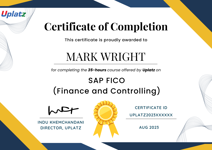SAP SD Sales and Distribution
Self-paced videos, Lifetime access, Study material, Certification prep, Technical support, Course Completion Certificate
Uplatz
Summary
- Uplatz Certificate of Completion - Free
Add to basket or enquire
Overview
Uplatz offers in-depth and extensive training on SAP SD (Sales and Distribution) module. This is video-based online course (self-paced training). You will be awarded Course Completion Certificate at the end of the course.
SAP SD (Sales and Distribution) module is a logistics module from SAP and is one of the most important components of the SAP Business suite. SAP SD module empowers the organizations to manage customer relationship starting from raising a quotation to sales order and billing of the product or service. This module is highly linked to other SAP modules like SAP Materials Management and SAP Production Planning.
Powered with an understanding and knowledge of the comprehensive functionality in SAP SD, you can effectively manage the entire customer life cycle efficiently and intelligently.
By the end of this training you will:
- Understand the core concepts of SAP’s SD module.
- Be able to apply the knowledge learned to progress in your career as an SAP SD consultant.
Earning Potential
As an SAP SD Consultant you can expect to earn £75,000+ in the UK and worldwide.
Certificates
Uplatz Certificate of Completion
Digital certificate - Included
Course Completion Certificate by Uplatz
Course media
Description
SAP SD - Course Syllabus
I. Introduction to SD
Introduction to ERP
SAP Overview
Functions and Objectives Of SD
Overview Cycle of SD
II. Organizational structure of an Enterprise in the SAP ECC system
Navigation basics- Easy access, favorites, settings
Creation Of Organizational Elements – Company, Company code, Plant, Storage Location, Sales organization, Distribution channel, Sales Office, Sales group and Assignments
III. Master Data
Material Master
Customer Master
Customer Material Information record
IV. Pricing Process and Determination
Pricing Condition technique overview
Define Access sequence
Define Condition Types
Define pricing procedures
Pricing procedure determination
Pricing conditions in sales order
Pricing conditions in Invoicing
V. Document Types for Pre sales and Sales Documents
(IN,QT,OR,QC,WK1,WK2,CS,RO,CR,DR)-vov8
Define Document types
Define Number Ranges for Document Type
Defining Sales document types with controls
Sales Item category defining and controls
Schedule line categories
Item category and schedule line categories determinations
VI. Sales Cycles - sales processes
Sales Inquiry Process
Sales Quotation Process
Contracts processing
Sales Order Process
Delivery and Shipping process
Invoicing Process
Credit and Debit Memo process
Credit Sales Process- Configuring credit checks, risk categories
Cash Sales process
Rush Order process
VII. Free goods processing
Free goods process overview
Free goods Condition technique
Exclusive and Inclusive free offers
VIII. Revenue Account Determination
Integration of SD with FI/CO
Revenue account determination process
Revenue account determination
G/L account determinations
IX. SD Basic Functions
Partner determination process
Output determination process
Text determination process
Material determination
Transfer of requirements
Availability check process
Incompletion process
Listing and Exclusion
Route determination process
Working with Bill of Materials
X. Special Sales Special Processes
Consignment Sales process
Stock transport order
Third party process
Returnable transport packaging – RTP
Intercompany Sales
Rebates processing
XI. Invoicing Plans
Periodic Invoicing
Milestone billing
XII. Variant Configuration
Variant Configuration Overview
Confuting variant configuration process
Working with variants & variants pricing
Testing scenarios in variant pricing
XIII. Integration with Other Modules and Support
Integration of SD with FI/CO
Integration of SD with MM
Integration of SD with PP
Idocs handling
Batch Jobs handling
Support Projects Handling documentation
Implementation Projects handling & documentation
Resume Preparation
Interview preparation
Who is this course for?
Everyone
Requirements
Passion and determination to achieve your goals!
Career path
- SAP SD Consultant
- Sales & Distribution Manager
- SAP SD End User
- Customer Relationship Analyst
- SAP Functional Consultant
- SAP Project Manager
- SAP CRM Analysts & Consultant
- Store Manager
- Supply Chain Professional
- Sales & Marketing Executive
- Sales/Logistics Consultant
- Business Analyst
- Master Data Analyst - SAP SD/MM
- SAP SD - Architect
- Business & Integration Practitioner
- Package Consultant: SAP SCM SD
Questions and answers
Currently there are no Q&As for this course. Be the first to ask a question.
Reviews
Currently there are no reviews for this course. Be the first to leave a review.
Legal information
This course is advertised on reed.co.uk by the Course Provider, whose terms and conditions apply. Purchases are made directly from the Course Provider, and as such, content and materials are supplied by the Course Provider directly. Reed is acting as agent and not reseller in relation to this course. Reed's only responsibility is to facilitate your payment for the course. It is your responsibility to review and agree to the Course Provider's terms and conditions and satisfy yourself as to the suitability of the course you intend to purchase. Reed will not have any responsibility for the content of the course and/or associated materials.


